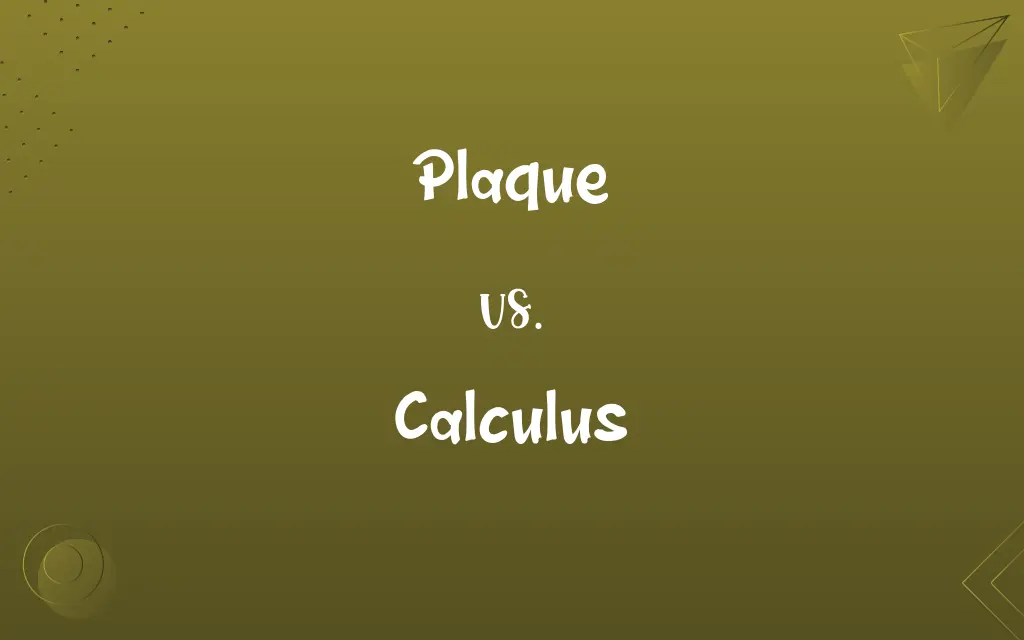Plaque vs. Calculus: Know the Difference

By Dua Fatima & Hifza Nasir || Published on September 30, 2024
Plaque is a soft, sticky film on teeth, while calculus is hardened plaque that's tougher to remove. Both contribute to dental issues but require different cleaning techniques.

Key Differences
Plaque forms on the surface of teeth due to the accumulation of bacteria, food particles, and saliva. Calculus, also known as tartar, develops when plaque hardens on the teeth over time. While plaque can be removed with regular brushing and flossing, calculus often requires professional dental cleaning.
Hifza Nasir
Sep 30, 2024
The development of plaque is a continuous process that can start to form just hours after brushing. In contrast, calculus forms over a longer period when plaque is not removed and mineralizes. This distinction emphasizes the importance of regular dental hygiene to prevent the transition from plaque to calculus.
Dua Fatima
Sep 30, 2024
Both plaque and calculus contribute to the development of dental diseases such as cavities and gum disease. However, because calculus provides a rougher surface that can hold more plaque, it can exacerbate these conditions more than plaque alone.
Dua Fatima
Sep 30, 2024
Preventing plaque buildup is key to avoiding calculus formation. Daily brushing and flossing effectively remove plaque, but once plaque becomes calculus, only a dentist or dental hygienist can remove it through scaling.
Dua Fatima
Sep 30, 2024
Both are harmful to dental health, plaque is easier to control and remove through daily oral hygiene practices. Calculus, due to its hardened state, not only requires professional intervention but also poses a greater risk to gum health and tooth integrity.
Dua Fatima
Sep 30, 2024
ADVERTISEMENT
Comparison Chart
Composition
Soft, sticky film of bacteria, saliva, and food particles
Hardened plaque, mineralized over time
Hifza Nasir
Sep 30, 2024
Removal
Can be removed with brushing and flossing
Requires professional dental cleaning
Dua Fatima
Sep 30, 2024
Formation Time
Forms quickly, within hours after eating or drinking
Develops over weeks or months from unremoved plaque
Dua Fatima
Sep 30, 2024
Health Impact
Can lead to cavities and gum disease
Increases risk of gum disease and cavities, provides a surface for more plaque accumulation
Dua Fatima
Sep 30, 2024
Prevention/Cleaning
Preventable and manageable with daily oral hygiene
Prevention through good oral hygiene; removal by dental professionals only
Shumaila Saeed
Sep 30, 2024
ADVERTISEMENT
Plaque and Calculus Definitions
Plaque
A soft, sticky film on teeth containing bacteria.
Brushing twice a day helps remove plaque and prevent cavities.
Hifza Nasir
Mar 01, 2024
Calculus
Requires professional cleaning to remove.
Dental scaling is used to remove calculus from teeth.
Dua Fatima
Mar 01, 2024
Plaque
Can lead to tooth decay if not removed.
Plaque that's not brushed away can harden into calculus.
Shumaila Saeed
Mar 01, 2024
Calculus
Provides a rough surface for more plaque buildup.
Calculus can make gum disease worse by harboring more bacteria.
Hifza Nasir
Mar 01, 2024
Plaque
Forms due to eating and drinking, especially sugars and starches.
Reducing sugary snacks can decrease plaque buildup.
Dua Fatima
Mar 01, 2024
ADVERTISEMENT
Calculus
Hardened dental plaque that's difficult to remove.
Regular dental checkups are necessary to remove calculus.
Hifza Nasir
Mar 01, 2024
Plaque
Removed by brushing and flossing.
Using an antiseptic mouthwash can help reduce plaque.
Dua Fatima
Mar 01, 2024
Calculus
Preventable by controlling plaque.
Effective plaque control can prevent the formation of calculus.
Dua Fatima
Mar 01, 2024
Plaque
Preventable with regular oral hygiene.
Daily flossing is essential for removing plaque between teeth.
Dua Fatima
Mar 01, 2024
Calculus
Forms from long-standing plaque that calcifies.
Ignoring plaque can lead to calculus formation.
Dua Fatima
Mar 01, 2024
Repeatedly Asked Queries
What is plaque?
Plaque is a soft, sticky film of bacteria, food particles, and saliva that forms on teeth.
Hifza Nasir
Sep 30, 2024
How is calculus removed?
Calculus requires professional dental cleaning, such as scaling, to be removed.
Dua Fatima
Sep 30, 2024
Why is it important to remove plaque?
Removing plaque is essential to prevent tooth decay, gum disease, and the formation of calculus.
Hifza Nasir
Sep 30, 2024
What is calculus?
Calculus, or tartar, is hardened plaque that has mineralized on the teeth.
Dua Fatima
Sep 30, 2024
How can plaque be removed?
Plaque can be removed with regular brushing, flossing, and the use of antiseptic mouthwash.
Dua Fatima
Sep 30, 2024
How quickly can plaque turn into calculus?
Plaque can start to mineralize and turn into calculus in as little as 24 to 72 hours.
Hifza Nasir
Sep 30, 2024
Are there any signs that indicate the presence of calculus?
Signs include yellow or brown deposits on teeth, especially near the gum line, and it often requires a dental professional to identify.
Dua Fatima
Sep 30, 2024
Can mouthwash remove plaque?
Mouthwash can help reduce plaque but should be used in conjunction with brushing and flossing for best results.
Hifza Nasir
Sep 30, 2024
Does eating sugar affect plaque and calculus?
Yes, consuming sugary foods and drinks can increase plaque buildup, which can lead to calculus if not removed.
Dua Fatima
Sep 30, 2024
Can calculus form without plaque?
No, calculus forms as a result of plaque that has not been removed and then hardens over time.
Hifza Nasir
Sep 30, 2024
Is calculus more harmful than plaque?
Yes, because it provides a rough surface that harbors more bacteria, making it more harmful than plaque.
Dua Fatima
Sep 30, 2024
How often should I brush to prevent plaque?
It is recommended to brush at least twice a day to effectively prevent plaque buildup.
Dua Fatima
Sep 30, 2024
Is it possible to completely prevent calculus formation?
While difficult, maintaining excellent oral hygiene and regular dental checkups can significantly reduce the risk of calculus formation.
Hifza Nasir
Sep 30, 2024
What tools are effective against plaque?
Toothbrushes, dental floss, and antiseptic mouthwash are effective tools for removing plaque.
Hifza Nasir
Sep 30, 2024
Can calculus damage teeth?
Yes, calculus can damage teeth and gums by harboring bacteria that lead to dental diseases.
Dua Fatima
Sep 30, 2024
Share this page
Link for your blog / website
HTML
Link to share via messenger
About Author
Written by
Dua FatimaCo-written by
Hifza Nasir







































































